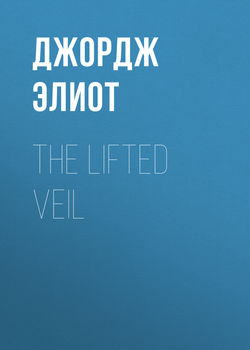The Lifted Veil

Реклама. ООО «ЛитРес», ИНН: 7719571260.
Оглавление
Джордж Элиот. The Lifted Veil
THE LIFTED VEIL
CHAPTER I
CHAPTER II
Отрывок из книги
The time of my end approaches. I have lately been subject to attacks of angina pectoris; and in the ordinary course of things, my physician tells me, I may fairly hope that my life will not be protracted many months. Unless, then, I am cursed with an exceptional physical constitution, as I am cursed with an exceptional mental character, I shall not much longer groan under the wearisome burthen of this earthly existence. If it were to be otherwise—if I were to live on to the age most men desire and provide for—I should for once have known whether the miseries of delusive expectation can outweigh the miseries of true provision. For I foresee when I shall die, and everything that will happen in my last moments.
Just a month from this day, on September 20, 1850, I shall be sitting in this chair, in this study, at ten o’clock at night, longing to die, weary of incessant insight and foresight, without delusions and without hope. Just as I am watching a tongue of blue flame rising in the fire, and my lamp is burning low, the horrible contraction will begin at my chest. I shall only have time to reach the bell, and pull it violently, before the sense of suffocation will come. No one will answer my bell. I know why. My two servants are lovers, and will have quarrelled. My housekeeper will have rushed out of the house in a fury, two hours before, hoping that Perry will believe she has gone to drown herself. Perry is alarmed at last, and is gone out after her. The little scullery-maid is asleep on a bench: she never answers the bell; it does not wake her. The sense of suffocation increases: my lamp goes out with a horrible stench: I make a great effort, and snatch at the bell again. I long for life, and there is no help. I thirsted for the unknown: the thirst is gone. O God, let me stay with the known, and be weary of it: I am content. Agony of pain and suffocation—and all the while the earth, the fields, the pebbly brook at the bottom of the rookery, the fresh scent after the rain, the light of the morning through my chamber-window, the warmth of the hearth after the frosty air—will darkness close over them for ever?
.....
“When you are quite well enough to travel, Latimer, I shall take you home with me. The journey will amuse you and do you good, for I shall go through the Tyrol and Austria, and you will see many new places. Our neighbours, the Filmores, are come; Alfred will join us at Basle, and we shall all go together to Vienna, and back by Prague” . . .
My father was called away before he had finished his sentence, and he left my mind resting on the word Prague, with a strange sense that a new and wondrous scene was breaking upon me: a city under the broad sunshine, that seemed to me as if it were the summer sunshine of a long-past century arrested in its course—unrefreshed for ages by dews of night, or the rushing rain-cloud; scorching the dusty, weary, time-eaten grandeur of a people doomed to live on in the stale repetition of memories, like deposed and superannuated kings in their regal gold-inwoven tatters. The city looked so thirsty that the broad river seemed to me a sheet of metal; and the blackened statues, as I passed under their blank gaze, along the unending bridge, with their ancient garments and their saintly crowns, seemed to me the real inhabitants and owners of this place, while the busy, trivial men and women, hurrying to and fro, were a swarm of ephemeral visitants infesting it for a day. It is such grim, stony beings as these, I thought, who are the fathers of ancient faded children, in those tanned time-fretted dwellings that crowd the steep before me; who pay their court in the worn and crumbling pomp of the palace which stretches its monotonous length on the height; who worship wearily in the stifling air of the churches, urged by no fear or hope, but compelled by their doom to be ever old and undying, to live on in the rigidity of habit, as they live on in perpetual midday, without the repose of night or the new birth of morning.
.....